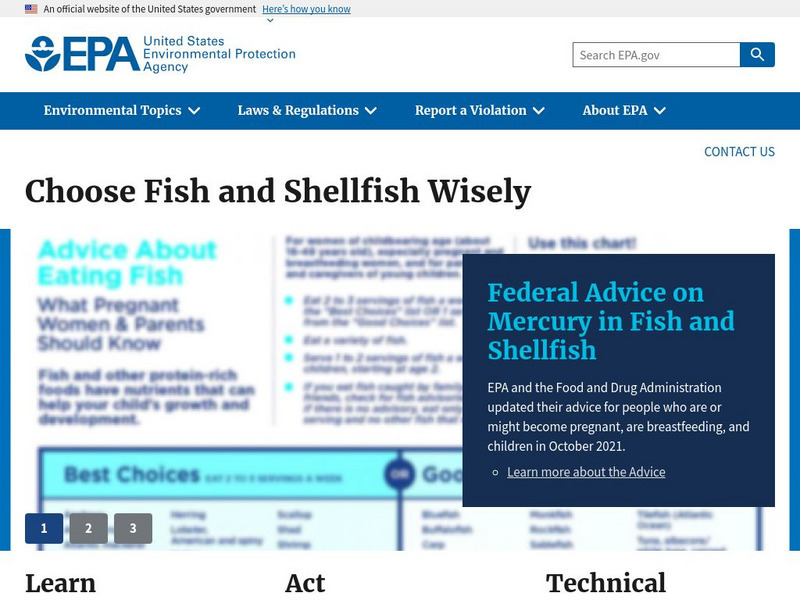NOAA
Seafood and Human Health
Whether your young biologists realize it or not, humans play a significant role in marine ecosystems. To help them understand this fact children first create graphical representations that show homo sapiens' place in marine...
Curated OER
Raw Seafood ~ On the Half Shell
The topic is fascinating, but there is not much for learners to do here. Food borne illness has always been a problem for humans to face, and here, data from the Center for Disease Control is analyzed. Learners look at the number of...
Curated OER
A Fishy Tale
Eighth graders do a research project on a particular species of Atlantic seafood and record and graph information pertaining to commercial landings of that species of seafood. They use a website and an Appleworks spreadsheet.
NOAA
Understanding Food Chains and Food Webs
Jump into an exploration of marine ecosystems with the first lesson in this four-part series. After first learning about crustaceans, mollusks, and other forms of sea life, young marine biologists view a PowerPoint presentation that...
Curated OER
Magazine Project
Groups of students create magazines that contain stories and images of one aspect of the ocean, and ocean life. The expectations for the final products are quite high, so this lesson will require some effort to properly implement. A...
Curated OER
Blue Crabs - The Blue Crab's Chesapeake Journey
A plethora of information about the blue crabs of Chesapeake Bay will amaze and delight your marine biologists. They learn, through direct instruction, about the characteristics and life cycle of this fascinating arthropod. A highlight...
Curated OER
Chilean Sea Bass
Introduce your mini-marine biologists to using databases. Tables of how many Chilean Sea Bass were caught and number of hours spent fishing are examined. Using the data, individuals calculate the "Catch per Unit of Effort" for each year....
NOAA
An Ocean of Energy
Young biologists trace the path of the sun's energy through marine ecosystems in the second part of this four-instructional activity series. Building on prior knowledge about producers, consumers, and decomposers students are...
Teach-nology
Author’s Purpose: Persuade
Explore author's purpose with an activity about persuasive arguments. After reading a short passage about Spain, learners identify three main passages that the author uses to persuade the reader.
Curated OER
Spanglish Exercise 2
Are your English language learners using Spanglish when they don't know the appropriate word? Have them study the chart at the top of the page. First they match the Spanglish phrase to its proper English meaning, and then they translate...
Curated OER
Conditional Tense: regular and irregular verb #2
The conditional tense expresses probability, possibility, and wonder. Teach your class how to conjugate verbs in the conditional tense, and then give them this short practice. There's a sentence provided in English, and then the...
Curated OER
Meal Planning
Students study the nutrients found in foods and the food pyramid. In this investigative lesson plan students will plan a seven day menu built around the food pyramid.
Curated OER
Ocean Market
Students identify some consumer goods that come from the ocean.
They classify these items into groups, identify their source, and calculate the cost of buying such goods.
Curated OER
There Are Algae in Your House!
Young scholars demonstrate that, although we sometimes can neither smell nor taste them, many ingredients in our foods and household products come from the sea. They also investigate food eat to determine algae derivatives they contain.
Curated OER
My Favorite Meal
Students investigate ecological systems and the multiple uses of the environment by studying the osprey population.
Other
Monterey Bay Aquarium: Seafood Watch Program
This resource is devoted to determining the types of seafood that you should and should not purchase, how fish are farmed and caught and what you can do to improve the awareness of sustainable methods of fish farming. Be sure to click on...
US Environmental Protection Agency
Epa: Choose Fish and Shellfish Wisely
Information on what you need to be aware of when eating fish, how to protect oneself, what the Environmental Protection Agency is doing to safeguard consumers, and research that has been done in this field of study.


















